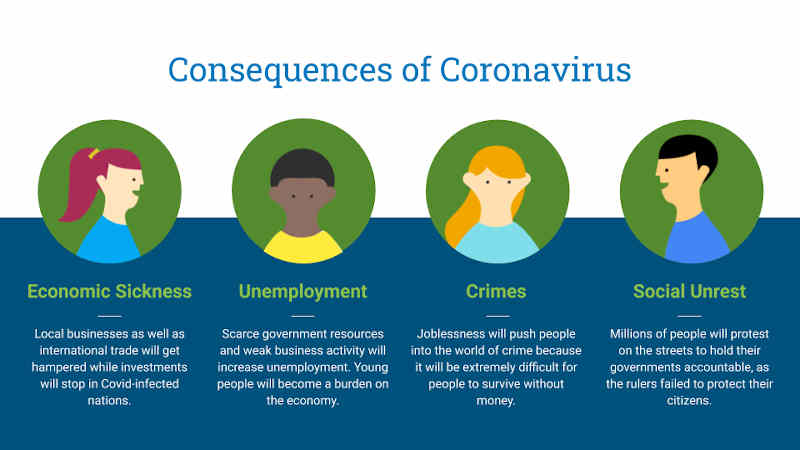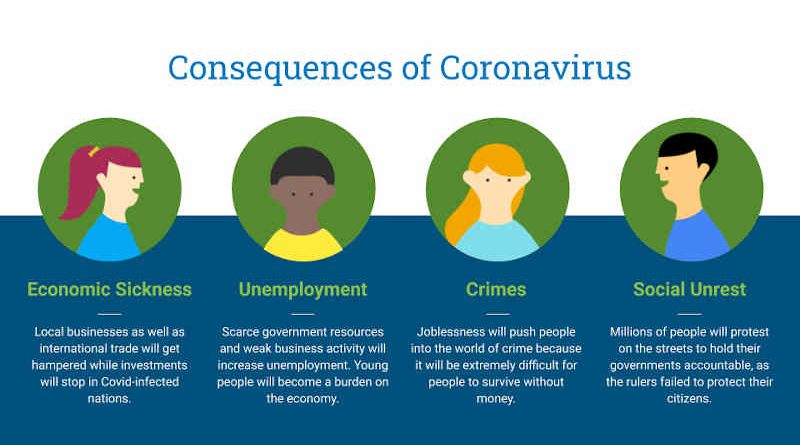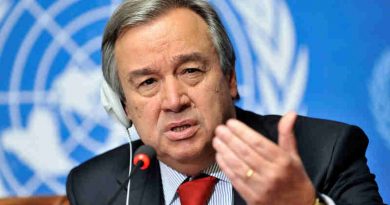Consequences of Uncontrolled Coronavirus: Political Instability and Social Unrest

Consequences of Uncontrolled Coronavirus: Political Instability and Social Unrest
In order to overcome this fateful outcome, the global community must take some bold decisions.
By Rakesh Raman
The countries such as the U.S., Brazil, India, and Russia where the governments have completely failed to contain the coronavirus (Covid-19) contagion will keep experiencing far-reaching consequences for many years to come.
These consequences – explained below – will include widespread health hazards, economic sickness, unemployment, unprecedented crimes, human rights violations, political instability, and social unrest.
Health Hazards: As the number of Covid cases will keep increasing despite the governments’ false claims of containing the virus, the already fragile healthcare systems will be completely devoted to Covid patients.
But it will be almost impossible for the hospitals as well as the medical staff to take care of the Covid patients and the patients who are suffering from other ailments. As a result, the diseases and deaths will increase sharply and the healthcare costs of the government will also go up dramatically.
Economic Sickness: Local as well as foreign investors will never be willing to invest in countries which are affected by coronavirus. As most local businesses will find it difficult to survive, the exports will also get hampered. Worse, the small and medium businesses (SMBs) – which are the backbone of the economy – will face unprecedented extinction and close their operations.
Unemployment: When the governments in these Covid-infected countries will have scarce budgets and businesses are closing, the joblessness in these countries will increase exponentially. This outcome is already visible, as large-scale layoffs are happening in such countries and there are hardly any new jobs.
Increase in Crimes: As a result of massive unemployment, the crime rates in these countries will increase exponentially. Moreover, the governments (bureaucrats and politicians) will also commit blatant crimes under the garb of tackling the pandemic and corruption will increase in government departments.
Human Rights Violations: The authoritarian governments which failed to mitigate the effect of virus in their countries will harass their citizens who question the governments’ failure in handling the health crisis.
In order to suppress any kind of dissent during the pandemic, the despotic governments are already committing human rights abuses against their citizens by arresting them and putting them in jails under false allegations.
Political Instability: As the pandemic and its damaging effect will persist in countries that are trying to downplay the extent of calamity, the election systems and voting processes will get disturbed. As a result, the ruling political parties will use unfair means to stay in power by hook or by crook. Obviously, the democratic systems will vanish and new dictatorship regimes will emerge to persecute and torture the commoners.
Social Unrest: The local citizens in almost all the nations – such as U.S., Brazil, India, and Russia –where coronavirus is spreading rapidly – have started protesting against their incompetent governments.
These protests are causing nationwide social unrest and disturbance which will exacerbate with the increase in unemployment, as the jobless people will have no other option but to occupy the streets to get the existing rulers dethroned.
Solution: The trouble in these autocratic nations will have a damaging impact on the entire world as large-scale migration – mostly through illegal routes – will happen and the poverty and destitution will increase in all the countries.
In order to overcome this fateful outcome, the global community must take some bold decisions. These decisions may include strict sanctions against the authoritarian rulers, their prosecution in international criminal courts, deployment of peace-keeping forces in the affected nations, and change of regimes in the authoritarian countries.
By Rakesh Raman, who is a national award-winning journalist and social activist. He is the founder of a humanitarian organization RMN Foundation which is working in diverse areas to help the disadvantaged and distressed people in the society.





